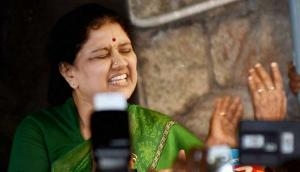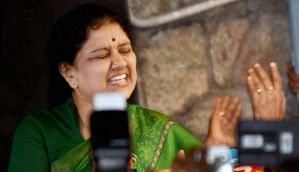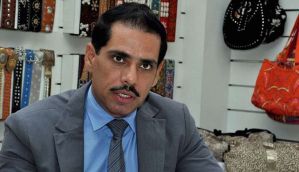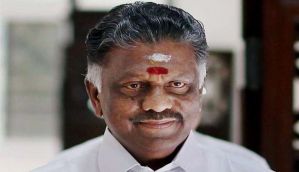After petrol and diesel price hike, LPG cylinder rate goes up by Rs 21
After the hike in petrol and diesel prices from midnight on 31 May, oil marketing companies on 1 June increased the rate of non-subsidised LPG cylinder by Rs 21 following an increase in global oil rates.
According to NDTV Profit, a non-subsidised domestic LPG cylinder in Delhi will now cost Rs 548.50. Petrol and diesel prices have risen by Rs 2.58 and Rs 2.26, respectively. The current price of petrol stands at Rs 65.60 per litre and diesel at Rs 53.93 pre litre.
The rate of aviation fuel (ATF) has also appreciated by a steep 9.2% and will now cost Rs 46,729 per kilolitre. The price hike in aviation fuel and non-subsidised LPG comes into effect from today.
I-T dept found emails between Vadra and Bhandari, sent queries to 7 countries
Defence consultant Sanjay Bhandari has admitted that the emails recovered from his computer during raids on his premises by the income tax department between 27 and 30 April this year, are between him, Robert Vadra and Manoj Arora, Vadra's assistant.
The emails were about the interiors of a flat in London, said I-T officials. One of the emails was dated 4 April, 2010, and was sent from Vadra's own email ID, according to The Indian Express.
The I-T department then, on 5 May, sent seven requests to the British Virgin Islands, the UK, and Dubai, for details of all Bhandari's property deals.
2 lakh Goans with dual citizenship must soon choose between India and Portugal
The union home ministry has accepted the recommendations of a committee set up last January to review cases of Goans with dual citizenship in India and Portugal, meaning that Goans with that privilege may soon have to choose between the two countries.
More than two lakh Goans have a 'Bill of Identity' from Portugal.
The issue assumes greater importance given that Goa's assembly elections will be held early next year, according to The Economic Times.
Portugal's Bill of Identity permits Goans to travel to Portugal and other EU countries without a visa, and also allows them to buy property and apply for a passport from any EU nation.
Undercover policeman shot dead by Maoists in Jharkhand
An undercover policeman was shot dead by Maoists in Gumla village, Jharkhand, on Monday night. Six armed rebels opened fire on Special Branch constable Bansidhar Tiwari, who went by the name of Vinod Tirkey, a tribal man, to gather intelligence, killing him on the spot.
They left behind pamphlets saying that Tiwari was killed for being a police informer.
"Details on how many bullets he sustained and other circumstantial evidence have not yet come, but the probe is on," said Gumla SP Bheemsen Tuti.
There were signs of a struggle at the site, said policemen, according to The Telegraph.
BJP leader arrested for molesting 13-year-old girl on a flight
A Gandhinagar-based BJP leader was arrested on Tuesday for allegedly molesting a 13-year-old girl on board a Goa-Ahmedabad flight on 29 May. The accused, Ashok Makwana, is closely associated with the BJP's local unit.
Inspector VR Patel of Sardarnagar police station said that they arrested Makwana based on a complaint filed by the girl's parents, according to ABPLive.
The FIR filed by the parents on Sunday said that a male passenger sitting next to the girl sexually harassed her during the flight.
28 criminal cases against BJP's Rajya Sabha nominee from Bihar
The BJP's Rajya Sabha nominee from Bihar, Gopal Narayan Singh, has 28 criminal cases against him. He also lost eight consecutive assembly elections, after winning once in 1977.
Singh says he was nominated because he is close to the RSS. "I am Sangh worker and because of my services, the party and the Sangh decided to reward me with the Rajya Sabha nomination," he said on Tuesday after filing his nomination papers.
BJP state party chief Sushil Modi said politicians in Bihar commonly have police cases against them, according to NDTV.
For baby sea turtles, it helps to have a lot of siblings
Sea turtles do not have an easy start to life. After hatching, they have to break out of their shell, dig their way out from beneath the sand, then make a mad dash across the beach to the water where they may or may not find food and safety - hopefully without getting snapped up by a predator. All of this requires a bit of luck and a lot of energy. And the energy a hatchling expends on breaking out of the nest is energy that can't be used on surviving the rest of the journey.Now, a new study has quantified the amount of energy a baby sea turtle uses to dig itself to the surface. Having lots of siblings - and, thus, lots of help - can really be a time and energy saver, researchers have reported in the Journal of Experimental Biology. That also implies that the conservation technique of dividing clutches may instead make hatchlings worse off.Figuring out the energy expenditure of baby sea turtles took some trial and error, a report in sciencenews.org said. For the final experiment, the scientists buried clutches of eggs just about to hatch beneath 40 centimeters of beach sand in a chamber with opaque walls.
China: No country for academics?
Political scientists and law experts are fleeing to America as Beijing's grip on freedoms in China intensifies under President Xi Jinping.Many academics feel there is no longer a place for them in President Jinping's increasingly repressive China, the Guardian has reported. As Chinese activist and scholar Teng Biao sat at home on the east coast of America, more than 13,000 km away his wife and nine-year-old daughter were preparing to embark on the most dangerous journey of their lives. "My wife didn't tell my daughter what was going on," said Teng, who had himself fled China seven months earlier to escape the most severe period of political repression since the days following the Tiananmen massacre in 1989."She said it was going to be a special holiday. She told her they were going on an adventure. "One year after their dramatic escape through southeast Asia, Teng's family has been reunited in New Jersey and is part of a fast-growing community of exiled activists and academics who feel there is no longer a place for them in Xi Jinping's increasingly repressive China. Until about 12 months ago China's top universities "remained islands of relative freedom", said Cohen, who has studied the Asian country for nearly six decades.







![BJP's Kapil Mishra recreates Shankar Mahadevan’s ‘Breathless’ song to highlight Delhi pollution [WATCH] BJP's Kapil Mishra recreates Shankar Mahadevan’s ‘Breathless’ song to highlight Delhi pollution [WATCH]](https://images.catchnews.com/upload/2022/11/03/kapil-mishra_240884_300x172.png)

![Anupam Kher shares pictures of his toned body on 67th birthday [MUST SEE] Anupam Kher shares pictures of his toned body on 67th birthday [MUST SEE]](https://images.catchnews.com/upload/2022/03/07/Anupam_kher_231145_300x172.jpg)






